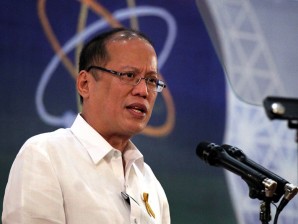Aquino puts on hold ‘very good’ news on economy
BALER, Aurora—Taking a brief pause from his increasingly heated verbal skirmishes with Chief Justice Renato Corona, President Benigno Aquino III on Sunday promised Filipinos “very good” news about the country’s economy in the next few days.
For now, all the President would say was that it concerned Philippine competitiveness in comparison with other economies.
“In the next few days, I will give you news that is very good concerning the economic sector,” Mr. Aquino said in a speech on the capitol grounds here during a visit to attend the 33rd founding anniversary of Aurora province.
He said he received the news two days ago and it had to do with a survey done by the Japan External Trade Organization, a group made up of Japanese businessmen.
He said the survey concerned competitiveness and “how easy it is to do business” in certain countries. He said the Philippines fared very well in 14 of 15 categories listed in the survey.
“There is only one category where we really have to work a little more,” he said, declining to elaborate. He said he would also have a piece of good news about the Philippine Economic Zone Authority, a government agency that extends assistance to export-oriented industries.
Protecting environment
Not all the good news is about the economy.
Environmentalists on Sunday said that when it came to environmental protection and addressing pollution, the Philippines had made strides in past two years, based on the Environmental Performance Index (EPI) that measures the environmental policies of 132 countries.
According to the EPI, the Philippines now ranks 42nd among 132 countries when it comes to protecting and managing the environment, placing the country under the “strong performer” category
The EPI was prepared by Yale and Columbia Universities in collaboration with the World Economic Forum and Joint Research Center of the European Commission.
The latest ranking represented a jump for the Philippines over its performance in 2010, when it was ranked 50th and listed as a modest performer.
Switzerland tops list
Based on the 2012 results, the Philippines retained its ranking of eighth in the Asia-Pacific region, higher than South Korea, Australia and Singapore, which ranked ninth, 10th and 11th, respectively.
The EPI measures a country’s performance in maintaining environmental health and ecosystem vitality. The data were based on studies across 10 policy categories, including air and water pollution, climate change, biodiversity and forest management.
The studies also took into account human-related indicators, such as child mortality and access to drinking water and sanitation.
Switzerland topped the list of governments addressing the problems of sustainable management of natural resources and air and water pollution.
The bottom five places in the ranking were occupied by South Africa, Kazakhstan, Uzbekistan, Turkmenistan and Iraq—all grappling with deteriorating environmental resources.
The EPI showed that the Philippines’ environmental policies in the past decade had improved. Specifically, the Philippines received a high mark in managing agriculture, with an overall rank of seventh. The country also made valiant efforts in decreasing air and water pollution, the study said.
However, the Philippines’ positive performance did not mean that the country excelled in other matters involving environmental protection. The study pointed out that the Philippines still faced problems of deforestation and proper watershed management.
Paje pleased
“We are pleased that the international community has recognized our efforts on environmental protection and management,” said Environment Secretary Ramon Paje.
“We would like to share this achievement with all sectors and stakeholders, including other agencies of the government, who have collaborated with us in our programs, particularly in cleaning the air and water, forest protection, national greening program, biodiversity conservation and other environmental protection initiatives,” Paje said.
He said Executive Order No. 23 and No. 26 issued last year, which imposed a moratorium on cutting trees in natural and residual forests and mandated massive replanting, should help the Philippines gain more forest cover.
In 2011, the Department of Environment and Natural Resources, other state agencies, local governments, private sector and civil society planted 69 million seedlings in more than 118,000 hectares of land nationwide under the national greening program.















